






































South Carolina had the second-highest population growth rate among the 10 states with the largest increases from 2022-2023.
= 10,000 people
South Carolina saw the second-highest rate of population growth over the last year compared to every other state in the nation, results from an analysis of population figures by a travel website and Census data show.
With more than 89,000 new residents, South Carolina had the fourth-highest actual increase in population among the 10 states that saw the highest rate of growth from 2022 to 2023, the analysis found. South Carolina followed Arizona, Georgia and North Carolina in actual population increase. The analysis was conducted by The Travel, a web portal that features reviews, historic guides and other travel information for popular destinations across the world.
Southern states made up four of the 10 states with the highest growth rate with South Carolina, Georgia, North Carolina and Tennessee, respectively, seeing the highest growth rate in the nation.
South Carolina, with a population of nearly 5.4 million, has been on a growth trend over the last five years with the pandemic giving the Palmetto State a surge of new residents. Data from the Census Bureau show the state’s population increased by 4.2% last year compared to five years ago.
The Travel editors pointed out that the Palmetto State saw an influx of people in 2020 when the COVID pandemic shifted how people worked and where they lived. As more people began telecommuting and looking for less density, South Carolina was an attractive option.
Quality of life also figured heavily into the reasons people are moving to the state, including South Carolina’s nice weather, options for outdoor recreation and terrain for everyone, including mountains and beaches along with the Midlands in between. The state also has a relatively low cost of living compared to many areas of the country, the analysis said.
“The remarkably affordable housing market further solidifies South Carolina’s position as one of the most favored states to move to consistently year after year,” The Travel editors said.
Sources:
1.75%
Idaho, South Carolina and South Dakota saw the highest rate of population growth from 2022 to 2023. Each state has varying degrees of population and cost of living, but all three show a comparable state and local tax rate.
The state has a tax rate of 8.4% and a population density of 24 people per square mile. Idaho has a cost of living of 106.10, which is higher than the national average based on the data from the Council for Community and Economic Research.
The Palmetto State has a tax rate of 8.9% and a population density of 179 people per square mile. The state also has a cost of living below the national average at 96.5.
One of the least populated states, South Dakota has a population density of 12 people per square mile and a cost of living below the national average at 93.8. The state also has a tax rate of 10.7%, including state and local taxes.
Data from other states shows how Idaho, South Carolin and South Dakota compare on tax rate, population density and cost of living. New York, for example, has the highest state and local tax rate in the nation at 15.9%. The state with the highest population density is New Jersey with 1,259 people per square mile. For cost of living, Hawaii is the most expensive place to live. Hawaii comes in at 179 or 79 points above the national average for cost of living.
Sources: Council for Community and Economic Research, U.S. Census Bureau, Tax Foundation, World Population Review
“While working at Nephron, I witnessed how the life sciences industry in South Carolina impacts and saves lives throughout our country. Our state has become an emerging leader in this industry and should be celebrated. ”
— Connor Watkins SCbio’s first full-time marketing director


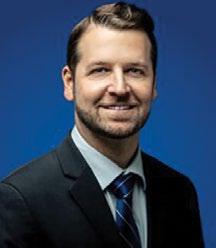
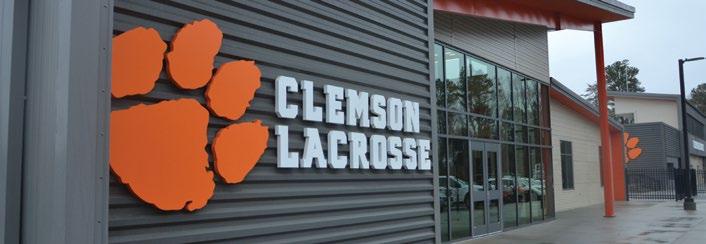
GSA Business Report
Clemson University recently completed a lakefront Women’s Sports Program Expansion project, a complex of facilities for the newly formed women’s gymnastics and lacrosse teams, as well as a first-of-its-kind Athlete Recovery Center.
Columbia-based architecture and interior design firm Garvin Design Group teamed with national sports architects HNTB to lead the design of this project, according to a news release.
The design team joined Clemson University officials, coaches, student athletes and construction manager Brasfield & Gorrie of Greenville for a ribbon-cutting ceremony to celebrate the project’s completion. The cost of the projects, including improvements to the nearby rowing complex, was $27.5 million, according to information provided by Garvin Design Group.
The expansion project includes a 24,000-square-foot gymnastics operations facility, a 9,000-square-foot lacrosse operations facility, and a lacrosse stadium with seating for 1,000 spectators. In addition, a new 10,000-square-foot Athlete Recovery Center provides amenities to all Clemson athletes.
Columbia Regional Business Report
Changes are coming to the Columbia Metropolitan Airport. The airport has begun work on a multi-year airport master plan project that will ultimately yield an introspective look at the airport’s current facilities, amenities and overall capacity to determine how it can better meet the needs of travelers for the next 20 years, according to a news release.
“Airport Master Plans provide a needed roadmap of sorts for future growth and development,” said President & CEO Mike Gula in the release. “From this plan, we will be able to determine a comprehensive properties list, coupled with realistic timelines to implement projects that will grow this airport over the next two decades.”
Guiding CAE through the process is engineering firm, Mead & Hunt, whose aviation planning division specializes in developing airport master plans, the release stated. Mead & Hunt has led numerous master planning projects at airports of all sizes across the United States, working collaboratively with airport owners and their local communities.









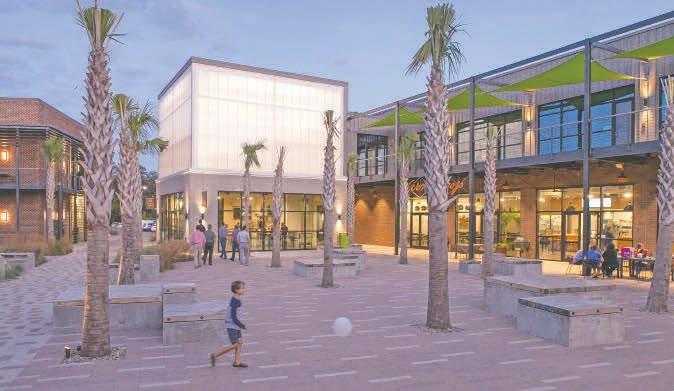




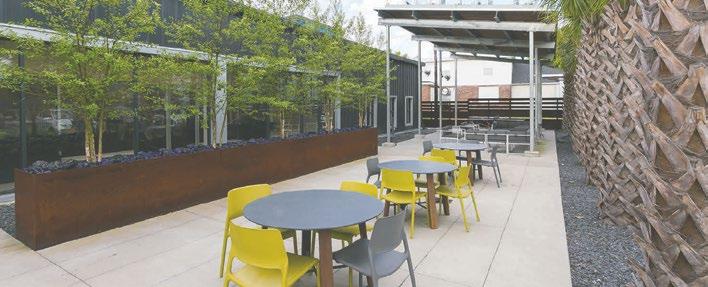
South Carolina’s Media Engine for Economic Growth
Donna Bischo , publisher SC Biz News dbischo @bridgetowermedia.com 843-804-6093
Jason Thomas, executive editor jthomas@scbiznews.com • 864-568-7570
Ross Norton, managing editor-content rnorton@scbiznews.com • 864-642-5229
Andrew Sprague, managing editor-production asprague@scbiznews.com • 843-628-4738
Krys Merryman, sta writer kmerryman@scbiznews.com • 864-640-4418
Steve McDaniel, editor Custom Publishing Division smcdaniel@scbiznews.com • 843.849.3121

WSales
Ryan Downing, director of sales rdowning@scbiznews.com • 864-867-1928
Amanda Alford, multimedia account executive aalford@bridgetowermedia.com • 843-849-3109
Shannon Pollard, multimedia account executive spollard@scbiznews.com • 843-804-6094
Tony Rossi, multimedia account executive trossi@scbiznews.com • 864-867-1920
Accounting ar@bridgetowermedia.com
Subscription Services service@bridgetowermedia.com • 877-615-9536
hen Redwood Materials, a producer and recycler of anode and cathode battery components for electric vehicles, announced it would build a plant in Berkeley County, it caused ripples throughout South Carolina.
Not just because of the sheer size of the project and investment cost — spanning more than 600 acres and costing $3.5 billion — but because of the name behind it. The Nevada-based company’s founder, JB Straubel, also co-founded EV giant Tesla along with Elon Musk.
Now all the renderings and public meetings are becoming tangible with work finally beginning at the plant in Ridgeville that is expected to employ 1,500 within the next 10 years.
In a statement, Redwood announced it is breaking ground for the first phase of construction at its Battery Materials Campus, located at the Camp Hall Commerce Park.
“We are starting construction on our first processing facilities to include refining from recycled content and processes for battery materials manufacturing,” the statement read, in part. “We’ll also begin accepting live battery cells at the Campus in 2024, which will include end-of-life batteries from electric and hybrid vehicles and consumer products. Finally, we will be building our first warehouse, office, and lab space during the first phase of construction.”
Redwood Materials, created in 2017, is the first company in the world that recycles used electric vehicle batteries and other types of batteries to extract crucial components that can
then be sent to car manufacturers to be put into new electric vehicle batteries. Currently, those components exclusively come from Asia.
Redwood Materials works with auto dismantlers to source used and end-of-life electric vehicle batteries, either when a car reaches the end of its life or was crashed and no longer drivable.
“This is the first step in the development of our Battery Materials Campus, and we will continue building and expanding the Campus over the next decade,” Redwood’s statement read.
The company said it will begin hiring in 2024 with a focus on roles primarily involved in site buildout, but expects its operational hiring ramp up to begin in 2025.
Redwood is partnering with readySC for recruitment and training. CRBJ
Charleston International Airport marked a significant milestone last year, notching more than 6 million travelers from January to December 2023, driving the airport to a new annual record.
For the month of December 469,477 passengers traveled through Charleston International Airport, a 10% increase compared to 423,636 passengers in December 2022, according to a news release. The 12-month activity through December 2023 totaled 6,153,540 passengers, a 15 % increase in passengers for the calendar year as compared to the year of 2022 with 5,324,147 passengers.
“The year-end numbers demonstrate why CHS is South Carolina’s favorite airport among airline passengers,” said Elliott Summey, executive director and CEO of the Charleston International Airport, in the release. “We have been laser-focused on developing an airport gateway that appeals to business and leisure travelers and visitors, drives the regional economy, and serves as a hub for commerce. With the continued confidence of our airline partners and the growth in



capacity planned at CHS, the trend is expected to continue in 2024.”
This growth has presented various challenges for management who have been working to meet the airport's evolving needs, the release stated. Over the past three years, several


essential construction projects were successfully accomplished. These include expansion of the jet fuel storage facility, which more than doubled in size, the creation of three additional gates, implementation of common-use gating to increase flexibility,



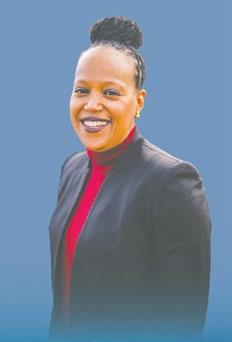
efficiency and optimize operations, and the opening of a 3,000-space parking garage.
"Our airport has enjoyed a unique growth trajectory since the pandemic that outpaces many of our peers, and we don't take this for granted,” Helen Hill, chair of the Aviation Authority and CEO of Explore Charleston, said in the release. “This incredible milestone is made possible only by the hard work and dedication of our tremendous CCAA employees and committed air service partners, as well as the support of our elected officials and local residents. I'm extremely proud of the CHS team and excited for what the future holds as the airport continues to solidify its place as a community asset, quality of life driver and key player in not just the travel and hospitality industry but our regional economy as a whole," said.
Looking ahead, in 2024, the airport authority anticipates continued growth from its airline partners, as future airline schedules reveal increased seats inbound and outbound at CHS, the release stated. The airport is currently undertaking design projects to include a new concourse, ticketing hall expansion and additional parking. CRBJ

Columbia, Md.-based developer has bought a parcel of land for an AC Hotel by Marriott in Summerville’s Downtown Nexton mixed-use development.
Developer Baywood Hotels bought 2.5 acres on the corner of Sigma Drive and Session Street, where the company plans to develop 117 guest rooms on four floors, according to a news release from Sharbell Nexton.
“The closing on the AC Hotel by Marriott marks a significant step in the development of Downtown Nexton,” Thomas Troy, president of Sharbell Nexton LLC, said in the news release. “Bringing an AC Hotel to the area further reinforces the mixed-use nature of Downtown Nexton, while expanding the services and lifestyle
options available to all residents and visitors of the greater Nexton/Summerville area. AC Hotels is a brand well known for delivering a combination of quality, modern design, convenience and authenticity, which aligns with the vision for this community.”
Plans for the hotel include an outdoor pool and courtyard, indoor kitchen and open lounge area, fitness room and meeting space, the release stated.
The project will be the third AC-flagged property in South Carolina. The others are om Spartanburg and Greenville.
Developers expect to break ground on the hotel in the third quarter this year, with an 18-month target for completing construction.
In addition to the AC Hotel by Marriott, previously announced plans in Downtown Nexton include The Ames and The Radler

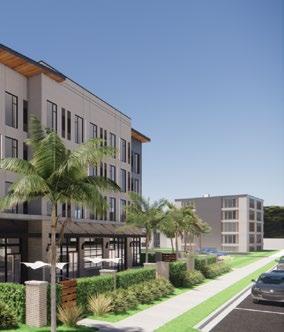
multifamily communities and Atelier office campus. Additionally, construction on the Lofts mixed-use/multifamily community
is underway. Downtown Nexton includes retail, dining, service, office and hospitality providers. CRBJ
An Orlando, Fla.-based quick service chicken tender restaurant bent on growth has chosen Goose Creek for its 56th location.
When Huey Magoo’s opened its first South Carolina location 17 months ago in Greenville, it was the company’s 29th.
Huey Magoo’s Chicken Tenders at 431 St. James Ave., Goose Creek, is the third in the state, according to company President and CEO Andy Howard, who said in a news release that with 265 franchises sold in 13 states, the company has a lot of plans to expand. The company plans to have nine in the area.
The 3,800-square-foot free standing restaurant features an outdoor patio and a drive-thru. This is the second of eight Huey Magoo’s stores planned for greater

Charleston and Columbia by franchisees Philip Horn, Don Bauer and Eddie Ward, who are also franchisees/operators of Papa Johns Pizza and Jersey Mike’s Subs. Huey Magoo’s Goose Creek will offer dine-in, take-out, catering and delivery through
third-party delivery services DoorDash and Uber Eats.
“We are very happy to hold the grand opening of our second Charleston area Huey Magoo’s location and bring the ‘Filet Mignon of Chicken’ to Goose Creek,” the franchisees
said in a news release. “Now, more locals can look forward to a fresh and flavorful new dining experience to enjoy and explore. We are also excited to be more involved with the supportive community here by offering our Spirit Nights program.”
The restaurants offer Huey Magoo’s signature grilled, hand-breaded or “sauced” premium chicken tenders, fresh salads, sandwiches and wraps. Each Huey Magoo’s tender is always made all natural, with no antibiotics, no hormones, no steroids and no preservatives, the company says.
Hours of operation are Sunday-Thursday, 10:30 a.m.–10 p.m.; Friday and Saturday, 10:30 a.m.-11 p.m. The company opened its first South Carolina location at 2029 Wade Hampton Blvd. in Greenville in the summer of 2022 and has since opened one in North Charleston at 4954 Centre Pointe Drive.
Founded in 2004, the company operates restaurants in 10 states. CRBJ
Anew locally owned burger joint has opened in North Charleston that has roots as a popular food truck.
Smashley’s Burger Bar opened Feb. 5, between Urban Nirvana and Accent on Wine, off Dorchester Road near Ashley Phosphate at 5401 Netherby Lane, Suite 1002.
The joint is owned by Victor and Ashley Valdivieso, the brains behind the popular Victor’s Lab food truck, according to a news release.
While Smashley’s Burger Bar gives
a feel reminiscent of 1980s movie classic “Cocktail,” and a little tonguein-cheek humor with its giant burgers eating fleeing humans through the Holy City, its smash burgers and bowls are the star of the show, according to the release.
“Seeing the successes of Victor’s talent with our food truck, it only seemed natural to expand our dream to having a brick-n-mortar,” Ashley Valdivieso said in the release. “But it is also scary — as is all unknowns. But we don’t believe in failure, just life lessons. So we are excited for this

Charleston seafood restaurant is marking a milestone while expanding its footprint.
Hank’s Seafood is celebrating 25 years of serving Lowcountry dishes to the Charleston community, and has revealed plans for an expansion.
The restaurant, which opened in 1999, is marking the milestone with anniversary events, programming and new offerings.
Hank’s opened on the corner of Hayne and Church Street in 1999, according to a news release. The turnof-the-century warehouse building that is now Hank’s was known as “an outlandish disco” that served as “the place to see and be seen” in the late 1970s, according to Hank’s website.
adventure and can’t wait to feed more people in Charleston and hopefully beyond.”
On the menu, there will be several all-beef smash burger options like the O.G. from Victor’s Lab food truck, with caramelized onions, house-made burger sauce and
“Being a part of Hank’s Restaurant and menu history has been very meaningful to experience,” said Hank’s Seafood Executive Chef Tim Richardson in the release. “Celebrating the remarkable milestone of 25 years is a testament to the unwavering support from our guests, dedicated team members and partners. I take great pride in being a part of Hank’s team and family.”
To kick off its anniversary in style, Hank’s is celebrating on March 2 with a ticketed cocktail party hosted at Hank’s Social Hall. Attendees will experience the restaurant’s history and traditions and classic Hank’s dishes, an open bar, live music and decor. Each guest will receive a Hank’s Seafood Restaurant Cookbook autographed by Culinary Director Frank McMahon. CRBJ
cheddar cheese, but new options including the Righteous Brother (all-American), the Bleu Corvette (with blue cheese, tomato jam, truffle burger sauce and smoked bacon) and the Greek-inspired Hey Zeus!, the release stated.
All burgers can come as a single patty or double.
For those non-cow lovers, Smash-

ley’s Burger Bar will also have the Hot Asian Chick (Asian pepper spicy crispy chicken, honey glaze and house-made pickles) and last but most certainly not least the Southern Buddha (a cauliflower patty), the release stated.
There is also a smattering of starters on the menu such as zucchini chips, fried cauliflower, Latin fries,
and PBR & Dr Pepper Braised Chicken Empanadas. For those looking for a little lighter entrée option at Smashley’s Burger Bar, they offer three different rice bowls-beef bulgogi, chicken and cauliflower.
The restaurant also offers a kids’ menu, and adults can enjoy a rotating selection of local beers, seltzers and ciders, the release stated. CRBJ








South Carolina Gov. Henry McMaster in his annual state of the state address promised to keep the state on the same track that has led to a booming economy by prioritizing education and infrastructure, maintaining business-friendly policies, inviting innovators into the state and keeping unions out.
“We are here tonight to address successes, challenges and opportunities,” the governor said in the annual State of the State delivered at the State House with legislators, members of his cabinet and the justices from the South Carolina Supreme Court in attendance.
McMaster said the state economy in 2023 created a record budget surplus, over $1.64 billion, with more
than $9.21 billion in capital investment and 14,120 jobs created. Since 2017, the state has announced more than $36.4 billion in new investments from companies creating 86,378 new jobs, he said.
Besides the business investments, McMaster pointed to the South Carolina attributes that attract new companies and inspire growth by existing ones, such as tourism destinations that are also good for the people who live here.
“South Carolina was named as one of the top five golf destinations in the world and best in the country for 2023, according to the International Association of Golf Travel Operators. Ours is the only state in the United States to make this list, sharing recognition with Cyprus, Dubai, Los Cabos and Thailand,” he said. “This reputation was evidenced in 2023
by the announcement of a new PGA TOUR tournament, the Myrtle Beach Classic, which will debut in May, joining the prestigious RBC Heritage tournament held the month before on Hilton Head Island.”
He also pointed to other destinations around the state, such as the Darlington Raceway, Charleston’s ever-present place on destination lists, Hilton Head being named the No. 1 island by Conde Nast readers and a destination newcomer: Greenville’s Unity Park, named by Reader’s Digest Magazine as one of the “Nicest Places in America.”
The governor also restated a commitment to investing in the education system needed to build a workforce, the initiatives from better teacher pay to college tuition assistance, in addition to investments in programs from kindergarten through higher education.
The governor stated that growth and development, while good for the economy, should not be undertaken at the peril of the state’s natural world that plays such a significant role in attracting not just tourists but the workforce needed to operates the industrial and business engines behind prosperity.
“South Carolina’s mountains, beaches, sea islands, lakes, and marshes are among the most beautiful in the nation,” he said. “This land, as noted by the explorers for kings and queens, is lush, fertile and brimming with abundance, flora and fauna. Our incomparable cultural and environmental heritage distinguishes our state and people from others. And all possess a strength and beauty we must never lose. For-
tunately, economic growth and the preservation of our shared heritage are not opposing objectives which must be balanced as in a competition, one against the other. Instead, they are complementary, intertwined and inseparable, each dependent on the other. To strengthen one is to strengthen the other.”
The governor said he is recommending to the Legislature that $33 million be appropriated to identify and preserve culturally or environmentally significant properties, disaster recovery and flooding mitigation efforts as well as beach renourishment projects along the coast.
“We cannot allow our state’s culturally and environmentally significant structures, monuments, lands, islands, and waters to be overcome by development, mismanagement, flooding, erosion, or storm damage,” he said. “It is our duty to preserve and protect our history, our culture and our environment, and the public’s access to them, before they are lost forever. We have a veritable army of people, and public and private organizations dedicated to these goals.”
Much of McMaster’s speech was about successful efforts to attract business investment and what the state is doing to keep the business-growth atmosphere healthy and vigorous.
“South Carolina is a national leader in advanced manufacturing. And now we are leading the way in the new and innovative electric vehicle and battery manufacturing industry,” McMaster said. “We are home to four major electric vehicle manufacturers, major international EV battery manufacturers, the nation’s largest EV battery recycling facility, and many other industries in the electric vehicle manufacturing supply chain.”
He pointed to the SC Nexus for Advanced Resilient Energy consortium developed by the South CarOlina Department of Commerce as an investment that will pay off by making the state a destination for business.
“This consortium was developed in collaboration with our research universities, technical colleges, state agencies, the Savannah River National Laboratory, economic development non-profits, and private businesses,” he said. “It is the culmination of groundwork laid in prior years through collaborative public-private initiatives. This cooperative spirit produced our EV Working Group, a one-stop shop to recruit and assist with electric vehicle investment and manufacturing in the state.”
The Commerce Department also produced the PowerSC Energy Resources and Economic Develop-
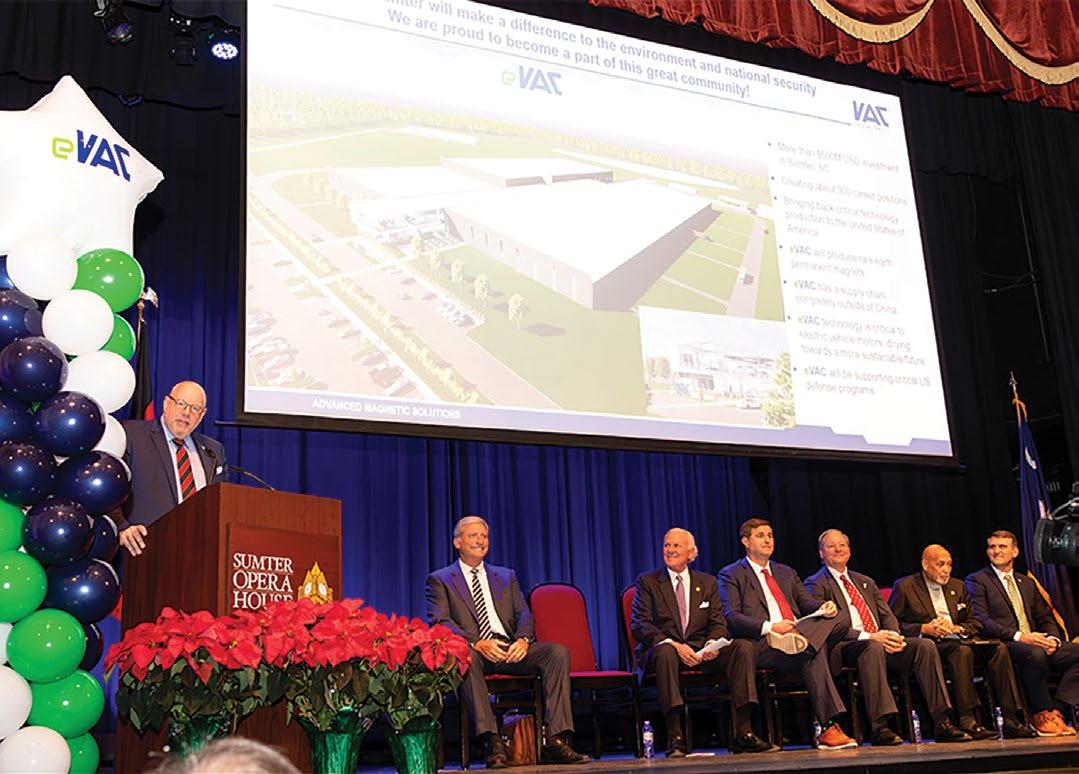
ment Interagency Working Group. This group leads the effort to coordinate the state’s energy stakeholders to ensure that we have the energy necessary to meet the needs of the future, he said.
Recently SC Nexus won the U.S. Department of Commerce’s Economic Development Administration’s designation as one of the Regional Technology and Innovation Hubs, which allows SC Nexus to apply for federal funding. Out of over 400 applications, South Carolina was one of 31 finalists selected.
“As a federal Tech Hub, SC Nexus will compete for federal grant funding valued between $40-$70 million annually,” McMaster said. “My executive budget includes $15 million to support SC Nexus and serve as the state “match” required for this competition. We are going to win.”
McMaster pointed to specific investments as highlights of economic recruitment in 2023.
Richland County, Scout Motors will revitalize an American brand as an all-electric, next-generation truck and SUV with a $2 billion investment and 4,000 jobs.
Chester County, Albemarle Corp. will invest $1.3 billion, with more than 300 jobs, for a lithium hydroxide processing facility.
Sumter County, e-VAC Magnetics’ investment of more than $500 million and creation of 300 jobs will produce rare earth permanent magnets which the governor said will help secure the United States’ domestic pipeline for
these rare earth magnets.
Laurens County, ZF Transmissions Grey Court is expanding its operation for the growing and evolving mobility industry with a $500 million investment and 400 jobs.
York County, Pallidus is relocating its corporate headquarters and semiconductor manufacturing operations to South Carolina with a $443 million investment and 405 new jobs.
Richland County, Cirba Solutions will build a state-of-the-art flagship operation to produce lithium-ion battery materials with more than 300 new jobs and a more than $300 million investment.
Spartanburg County, Milo’s Tea Company, a family-owned beverage company, will establish operations with a $130 million investment and 103 new jobs.
McMaster recognized Secretary of Commerce Harry Lightsey and his team: “You all made the right decisions,” he said. “We boomed in 2023 and will boom again in 2024.”
The success on that front has led to challenges on another, he said.
“The demand for a trained EV workforce is outpacing the number of qualified applicants,” McMaster said. “Manufacturers like BMW, Mercedes-Benz Vans, Volvo Cars and Scout Motors will need a highly specialized and trained workforce of almost 20,000 South Carolinians, and they will need them soon. To meet this demand, my executive budget recommends $50 million to create specialized EV training institutes at
our technical college campuses.”
What the workforce does not need, the governor insisted, is help from labor organizers.
“One thing we do not need is more labor unions,” he said. “We have gotten where we are without them, and we do not need them now. … We have worked hard and carefully — through education, training and business recruitment — to earn our record prosperity, and we will continue to preserve and enhance it.”
He blamed unions for crippling the economies of other cities and states and, he said, with their numbers dropping unions are eyeing the prosperous Southeast for new members.
“Our aerospace, vehicle and tire manufacturers are no longer the sole targets for labor organizers,” he said. “Our thriving hospitality and tourism industry along our coast now finds itself a target. It seems that no business or employee in South Carolina is safe from the disingenuous campaigns and destructive impacts of union infiltration. No one should bargain their prosperity under threats of union boycotts or coercive pressure campaigns. We will not let our state’s economy suffer or become collateral damage as labor unions seek to consume new jobs and conscript new dues-paying members. And we will not allow the Biden administration’s pro-union policies to chip away at South Carolina’s sovereign interests. We will fight. All the way to the gates of hell. And we will win.” CRBJ
AmoveBuddha study showed that South Carolina was the most popular state to move to in 2023, continuing its influx of migration hot streak.
The report shows that the Palmetto State had a moving in-to-out ratio of 2.1, meaning more than twice as many people searched for moves into the state than out of it.
Other South Carolina highlights from the study include:
• SC also earned the highest net searches from movers per capita of all the states.
• Four South Carolina cities were among the top 25 most popular cities to move to in 2023, including No. 2 Myrtle Beach and No. 5 Summerville.
• States known for affordability and boasting mountain terrains saw major interest from movers, including South Carolina, Montana, North Carolina, Colorado, Tennessee, and Maine.
Overall, the South dominated the list of top 25 most popular cities to move to in 2023.
Surveys continue to show that reasonable housing prices and the overall low cost of living in South Carolina are a big part of the reason people are moving here, said Hannah Hopewell, South Carolina Chamber of Commerce membership and communications manager.
“People are moving to the state for the low taxes, warm weather, a good quality of life and reasonable housing prices,” Hopewell added. “Many are also attracted to the jobs that are being created in our economy.”
South Carolina Gov. Henry McMaster recently announced that 14,000 new jobs were added to South Carolina’s economy in 2023. This is on top of the 14,000 jobs that were added in 2022, she said.
“Companies are moving jobs to South Carolina in record numbers,” said Hopewell. “Many of those moving here will join our workforce and help to fill those new jobs and existing jobs that are currently unfilled. Our population growth is a major attraction for companies looking to move to the Southeast.”
Population growth represents economic opportunity, not just for those moving to the state but also for those who are already here. It is important to do the right things — such as investing in the workforce and infrastructure — to maintain that growth, she added.
“Population growth creates economic opportunity for people and companies who are already here by expand-

ing the economy in which we live,” said Hopewell. “The newcomers buy houses, insurance products, food and other goods and services that are produced here. They help fill the jobs that make our companies successful. Some are entrepreneurs who will put people to work. They contribute to the tax base that funds public services at the local and state levels, which helps to keep taxes low.”
Nick Kremydas, CEO of South Carolina Realtors, agreed that South Carolina offers a quality of life that not many other states can provide — and it’s that quality of life that makes South Carolina so attractive, he said.
“Our elected leaders have done a great job of making South Carolina a strong economic force in the U.S. and the world, attracting jobs, and creating opportunities for our citizens and communities,” said Kremydas. “‘Jobs need a home to sleep in at night,’ as homebuilders like to say.”
Various studies confirm that Americans are moving less than ever before. According to a data analysis by the National Association of Realtors, the U.S. moving rate has declined overall in the past six years.
For people still moving, remote work may continue to be a factor in location-independent Americans’ searches, the study revealed.
The rate of remote work in U.S. households is the lowest it’s been since the pandemic started, according to the U.S. Census Bureau. But the rate is still much higher than it was in pre-pandemic times.
Freedom from the office may still enable Americans to broaden their searches for states and cities with a high quality of life, a reasonable cost of living, and where they think they can thrive in 2023 and beyond, no matter what, according to the study.
So, how does the influx of movers affect residents and the housing market in South Carolina?
“To better understand the impact on the real estate market today, we have to review the recession of 2008,” said Kremydas.
South Carolina’s population has grown at a steady pace since the recession in 2008, he said. While the recession led to better underwriting and overall lending practices and corrected what was an overheated real estate market, he added, it also had the effect of wiping out many of the local homebuilders in the state and across the country.
“As a result, we’ve experienced more than a decade of historically low building levels, especially in the single-family housing market,” Kremydas said. “Why is this important? Because for the last 12 years, South Carolina has been one of the fastest growing states. The results of this imbalance have played out in the
marketplace (especially since the onset of the pandemic) with escalating prices and extremely limited inventory.”
Home prices in South Carolina have increased by almost 50% since 2020, he said. “Great news if you’re a homeowner, not so great if you’re buying. Middle-class South Carolinians have been struggling to afford to live close to their work, which is made even tougher in today’s environment when you also add in higher interest rates, which are now thankfully on the decline.”
The state still needs supply to catch up with the demand for home prices to stabilize, Kremydas added.
“I think we’re quite a few years away from that, as it will take some time to make up for a decade of underbuilding,” he said. “In our fastest growing metros, there are a few that condemn growth and development and actively strive to limit or stop growth through moratoriums, taxes, fees, etc. But Realtors want to see South Carolina grow responsibly, ensuring our communities have the infrastructure, schools, open space, economic growth, etc. they need to continue to be so attractive and provide a great quality of life. It can be done. Policies to slow or stop growth generally will exacerbate the problems we already have. Again, when you artificially shrink supply, prices will go up, disproportionately affecting working class South Carolinians and those families aspiring to homeownership.” CRBJ
Where some merely saw a bubbling pond or lagoon — a common catch-all for organic waste and byproducts for large farms and processing facilities — Marc Fetten saw opportunity.
The Charleston resident traveled the world in mergers and acquisitions for a pharmaceutical company. He started his own investment group in 2009 which focused on renewable energy and infrastructure projects and oversaw utility platforms for major industrial parks.
He traveled often to farms and other agribusinesses on business and saw the ponds on site being used to decompose food scraps and organic waste in a process called anaerobic digestion.
He thought, “Why not trap that methane and covert it into renewable natural gas to create a sustainable and climate-friendly way to generate electricity?”
Fetten knew that countries in Europe had already embraced this type of natural gas source rather than rely as heavily on fossil fuels. In South Carolina, however, there wasn’t a big player offering sustainable, renewable natural gas. Fetten saw the opportunity to tap into “Big Ag” agricultural sites.
“These businesses were making methane by letting their organic waste biodegrade on their sites,” Fetten said. “I quickly entered into discussions to see if we could build a renewable business around it, and we had some very willing parties who let us experiment.”
In 2019, Fetten went all in on his latest venture, taking out a mortgage on his home in Charleston to start GreenGas USA as the founder and CEO.
The science involved finding a way to physically cover these ponds, lakes and lagoons — some as large as 20 acres — with a tight synthetic membrane in order to trap the gases coming off of the water and covert the methane into to renewable natural gas, transportable by tank that could be brought directly to a natural gas pipeline.
Using specialized equipment installed on site at these agribusinesses, Fetten found the science was a success. GreenGas USA found a way to prevent harmful methane gas from seeping into the atmosphere, transforming it into renewable natural gas.
Fetten and his team of 11 employees hit the ground to find agribusiness partners willing to have their ponds covered and converted, as well as finding business customers interested in
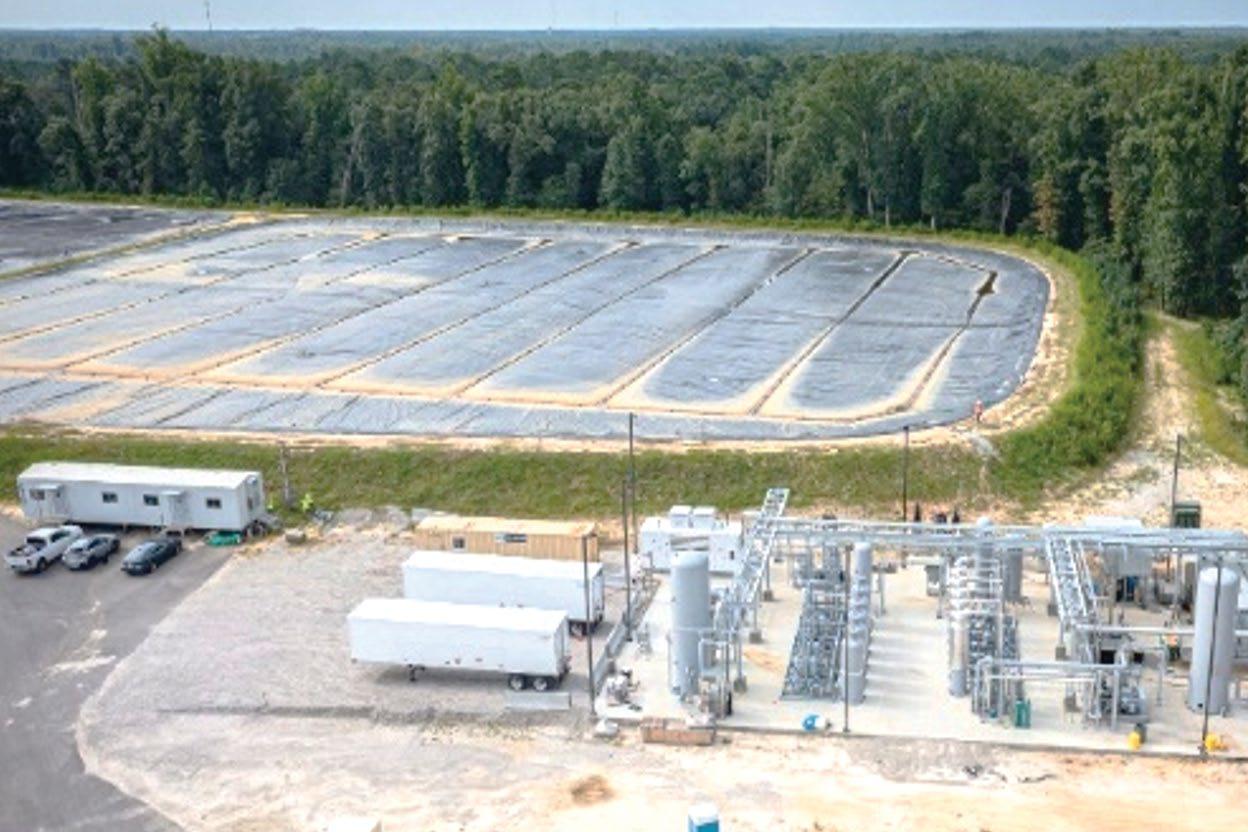
buying the renewable natural gas.
Early agribusiness partners that were testing grounds included McCall Farms in Effingham; Perdue Farms chicken processing facilities in Lewiston, N.C. (now at a second location at their site in Cromwell, Ky.) and Sonoco’s wastewater treatment site in Hartsville. GreenGas USA installed millions of dollars in equipment at each site to capture the methane to turn it into renewable natural gas.
While the renewable natural gas is a higher price point than traditional fossil fuel, Fetten said many large manufacturers and business owners that purchase carbon and renewable gas are interested in the model to help reduce global warming by taking methane, a highly potent greenhouse gas, out of the atmosphere. GreenGas USA is used by customers as a zero and negative carbon fuel source to offset and reduce fossil fuel consumption.
“We're doing a lot to curb global warming and creating a renewable fuel that replaces fossil fuel,” Fetten said. “By the time we're done treating it, it's exactly the same (output) as fossil natural gas and it can be used in the same way.”
An early customer of the renewable natural gas was Mercedez-Benz in Ladson, which signed a long-term contract with GreenGas USA and will use the natural gas to power its paint shop, Fetten said.
“South Carolina has done a really good job of recruiting Western European-owned manufacturers. If I had to rate interest from companies (in battling climate change), it’s companies that are rooted in Western Europe,” Fetten said. “Amazon, which buys a lot of their vans, I imagine has asked them to find ways to make the manufacturing process carbon neutral. That includes converting things like their paint shop from fossil gas to renewable natural gas.”
The “sales” portion of the business continues to be equal parts selling and education, teaching potential customers about the science of removing methane from the environment and the ability to set new industry sustainability standards.
An average day for the executive team could be talking with a chief sustainability officer at a Fortune 500 company — either about selling gas to them or capturing gas from their operations; working on the technical side by monitoring the amount of gas that's being produced in agribusiness lagoons and tweaking treatments and settings on equipment. The company also does a lot of innovation.
“We came up with a system that isolates the CO₂ out of these lagoons and we're using it to make cryogenic material,” Fetten said.
The business is also boon to the agribusiness sector, as GreenGas USA ends
up paying the farmers and agribusiness partners for their methane-produced natural gas, which is shipped by GreenGas USA employees to major customers across South Caroliana and beyond.
“We end up paying the farmer for their waste — something that is worthless to them and actually quite a nuisance. We invest money to make their system better, make a renewable fuel out of it and once we've repaid ourselves for the project, we end up cutting them checks,” Fetten said.
What started from humble beginnings is now poised to be a major partner with big agribusiness and large customers and could disrupt a dependence on fossil fuels.
Just more than three full years after launching the business, GreenGas USA is backed by massive investments including IFM Investor, an Australian pension fund with $143 billion under management that invests in renewable businesses, Fetten said. A leading model for industry-led climate solutions, GreenGas USA now has 50 full time employees and is on its third round of fundraising.
“We've got five operating sites (on agribusinesses), five under construction and we’ll probably build another 20 over the next year or two,” Fetten
said. “We’re growing really quickly. We’ve had 52 offers for capital (fundraising).”
While the majority of customers are carbon and renewable energy buyers in South Carolina, Fetten has expanded the business nationwide. He said plans to make an announcement about a partnership with a major customer in North Carolina within the next few weeks. The company has even installed specific infrastructure to make transporting the natural gas easy and efficient across state lines.
“We've built two pipeline injection points in Georgetown, S.C., and in Pleasant Hills, N.C., so if the local pipeline won't let us inject near where we make the gas, we compress it and truck it to these pipeline injection points and then we can bring it anywhere in the country from there,” Fetten said.
Customers are located in Colorado, Kentucky, Florida and Texas. Fetten said there is growing interest every day in the product and its ability to take greenhouse gases out of the atmosphere.
“We're learning that coastal communities have a much greater appreciation for climate change because they actually see it. If you talk to people in Miami or Wilmington or Charleston or Savannah, they ‘get it’ and they're in the process of using taxpayer money to fight flooded roads and drainage systems,” Fetten said.


In order to be a true disrupter for fossil fuels, the company needs to continue to create great partners in Big Ag and beyond. Municipal wastewater treatments facilities may be the next untapped resource to capture methane for renewable natural gas, Fetten said.
“The demand for the gas is more than double the amount that we can make on any given day, so our focus


as a management team is to find more and more sources, not just to satisfy demand, but also because every (pond) that we cover and treat is less methane going to the atmosphere. It satisfies our environmental desires of doing good things,” Fetten said.
He said the team is working on being able to create technology to apply the model to smaller farms.
“It's a matter of scale. The technology doesn't exist yet to do small farms, but it's getting there. We started with ‘Big Ag’ but over time, I think we'll see us being in smaller farms,” Fetten said. “We need to go national to really have the environmental impact that we want. Fortunately, many of the companies we work with do have a national footprint.” CRBJ






































Three South Carolina chefs will represent the state’s culinary scene at food festivals and other events after being named South Chef Ambassadors for 2024.
The three were appointed Jan. 18 by Gov. Henry McMaster, Commissioner of Agriculture Hugh Weathers and Duane Parrish, director of the South Carolina Department of Parks, Recreation & Tourism, according to a news release.
The three honorees are:
Lowcountry
Chef Leslie Rohland of The Cottage Cafe Bakery and Tea Room, Bluffton.
As founder, owner and head chef/baker at The Cottage Café, Bakery & Tea Room, Rohland serves up innovative cuisine and Southern hospitality in Bluffton. After the success of The Cottage, she opened May River Coffee Roasters, The Juice Hive, SideCar Catering, and The Bluffton Pasta Shoppe, all committed to offering fresh, local cuisine.
Upstate
Chef Michael Sibert, Anonymous Burgers, Greer
Sibert hails from Greenwood and is a graduate of Cornell University and the Culinary Institute of the Carolinas. He trained in New Orleans before moving to Greer, where he has headed up high-end
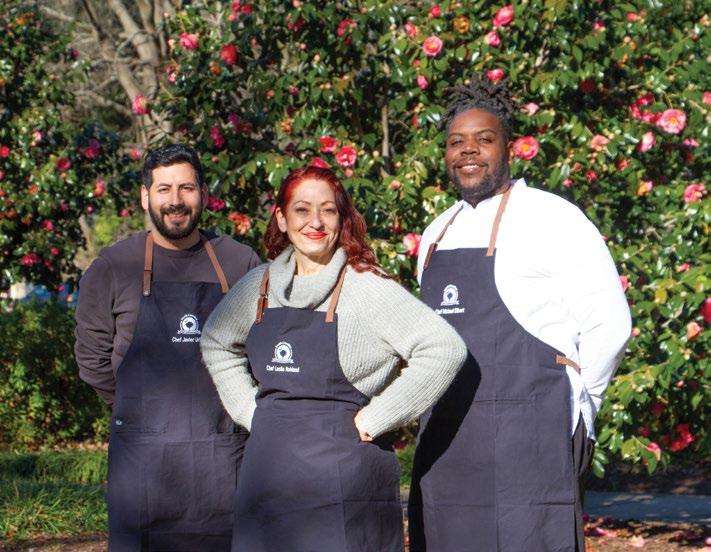
eateries for more than a decade. He opened Anonymous Burgers in Cartwright Food Hall in 2023.
Midlands
Chef Javier Uriarte, Ratio in Elgin
Chef Javier gained his culinary experience in Washington, D.C., area restaurant kitchens before moving to Columbia in 2013. He is chef and owner of Ratio in the Kershaw
County/Northeast Columbia region, a tapasstyle restaurant influenced by his Peruvian background and Southern comfort food.
This is the 10th year of the program, which was created in 2014 to highlight South Carolina as a destination for great food. Chef Ambassadors represent the state through food festivals and other promotional opportunities, sharing South Carolina’s culinary traditions, agricultural heritage and undis-
covered places with the world.
“The Chef Ambassador program celebrates two important sectors of our booming economy — agribusiness and tourism," McMaster said in the release. “Our state’s outstanding culinary talent contributes to the rich cultural heritage and quality of life that makes South Carolina unique and attractive to all.”
South Carolina Chef Ambassadors support the state’s farmers by using Certified South Carolina produce, meats, dairy, seafood and other farm-fresh foods in their own ways.
“South Carolina’s food culture is second to none, and farmers make it all possible,” Weathers said in the release. “I’m impressed by how each and every Chef Ambassador over the past 10 years has supported local food and forged relationships with farmers, and I look forward to working with this talented new class.”
Parrish said the program is beneficial for tourism because the ambassadors help showcase the diversity of South Carolina’s flavors as well as different destinations statewide.
“From their signature dishes to the cities and towns they passionately represent, our Chef Ambassadors have helped enhance and amplify our culinary reputation with audiences around the world,” Parrish said in the release. “I know our 2024 class will continue that tradition.”
To learn more about the program and past Chef Ambassadors, visit discoversouthcarolina.com/chef-ambassadors. CRBJ
The South Carolina Department of Agriculture is preparing to take on some food safety regulatory duties — including retail kitchen inspections — that are currently handled by the Department of Health and Environmental Control.
Starting July 1, the South Carolina Department of Agriculture will handle all retail food safety inspection, including restaurant kitchens, school cafeterias, caterers, grocery stores, some convenience stores and more. The Agriculture Department also is taking over DHEC’s Manufactured Food Programs, including soft drinks, cheese and dairy, bottled water and ice. Agriculture also will oversee the milk inspection program and laboratory, according to a news release.
The South Carolina General Assembly diverted the responsibilities to the Agriculture Department as part of S.399, a bill that restructures DHEC and divides its oversight among new and existing agencies, the release stated.
SCDA has regulated wholesale food manufacturing for nearly 50 years, according to the department’s news release. The

agency also regulates animal feed safety, specialty food producers, and produce farming, and has well-equipped specialized labs that conduct a variety of regulatory testing.
“The South Carolina Department of Agriculture has a great reputation for protecting the public and working with South Carolina businesses,” Commissioner of
Agriculture Hugh Weathers said in the release. “These new duties will strengthen our ability to assure food safety while also streamlining services for businesses, some of which are currently regulated by both SCDA and DHEC. This is good news for farmers, too. We’ll have even more involvement in every step of the food system, from when it’s
grown to where it’s eaten. We look forward to serving our state in new ways as we affirm our longstanding commitment to food safety and a strong agriculture industry.”
SCDA and DHEC are working together with the South Carolina Department of Administration to assure a smooth transition for customers, employees and the public, the release said. SCDA will roughly double in size, with about 115 positions transferring over from DHEC. DHEC food safety staff will join SCDA’s existing Consumer Protection Division, which includes all the agency’s regulatory departments.
“The food safety regulations aren’t changing, but the public will see some changes — and not just a new logo on the restaurant door,” Assistant Commissioner for Consumer Protection Derek Underwood said in the release. “South Carolina consumers and the businesses we inspect can expect a responsive team dedicated to helping improve food safety. We look forward to continuing to earn public trust with these new responsibilities.”
Over the next eight months, SCDA will post regular updates on the transfer online. CRBJ
Nova Molecular Technologies, a high-purity solvents manufacturer, is expanding its operations in Sumter County.
The company’s $23.75 million investment will create 20 new jobs, according to a news release from the South Carolina Department of Agriculture.
Since establishing its South Carolina operations in 2014, Nova has expanded to four Sumter County locations, including two production facilities, according to the release The company later sold its Texas facility to concentrate manufacturing operations solely in South Carolina.
“Nova Molecular Technologies is constantly seeking innovative solutions and technologies that align with our unwavering sustainability-first mindset and our mission to deliver exceptional value for our customers,” Nova Molecular Technologies CEO Chris Adams said in the release. “We are grateful for the part-

nership with Sumter Economic Development and support from our local and state government partners as it allows us to move into our next phase of expansion in Sumter that supports our long-term growth objectives. It also ignites oppor-
tunity to boost our employee base and benefit Sumter and the State of South Carolina.”
Nova’s latest expansion will add additional square footage to its existing facility located at 1123 Race Track Road,
which will enable further development of the processes and technologies needed to meet growing customer needs, the release stated.
“Nova Molecular Technologies is creating high-tech, highly skilled jobs while working to support the agribusiness industry here and across the globe,” South Carolina Commissioner of Agriculture Hugh Weathers said in the release. “We celebrate their success as they announce this latest expansion.”
Founded in Texas in 1991, Nova is a leader in high-value solvent recovery technology, the release stated. The company’s Recover and Return model launched in 2017 and helps customers reduce their environmental impact by recovering chemicals that would otherwise be sent to waste disposal.
Nova also manufactures and markets chemicals that are used in the biopharma, analytical and agricultural markets, according to the release.
The expansion is expected to be complete by 2028. CRBJ
Aformer Nephron Pharmaceuticals communications professional takes reins as first fulltime marketing director to lead efforts to support the surging South Carolina life sciences industry.
Following a thorough search that considered marketing and communications professionals from across the region, SCbio named Connor Watkins as its first full-time marketing director, effective on Jan. 1, according to a news release.
At Nephron Pharmaceuticals, a worldwide leader in production of generic respiratory and 503B outsourcing medications, ophthalmic and injectable medications, and employer of more than 1,200 associates, Watkins led corporate events, community partnerships and sponsorships, and supported corporate communications initiatives for the West Columbia-based manufacturer.
While at Nephron, which is a founding partner of SCbio, Watkins directed the production of corporate events, wrote and distributed corporate communications to state and national media, and created content for internal and external executive communications while working directly for Nephron CEO Lou Kennedy, a three-time chair of the SCbio board of directors and currently serves on the organization’s Fidu-
ciary and Operations Committee.
Prior to joining Nephron in 2021, Watkins, a graduate of the University of South Carolina with a B.A. in Journalism and Mass Communication, as well as a graduate of Leadership Lexington County, served as multimedia strategist for the Lexington Chamber and Visitors Center, developing and implementing communications and marketing programs for the 800-member association. While with the Lexington Chamber, Watkins was honored with multiple awards for communications excellence by the Carolinas Association of Chamber of Commerce Executives.
“SCbio and South Carolina life sciences are excited to welcome Connor to help lead and tell the story of this dynamic and forward-looking industry, and to help our hundreds of life sciences companies and thousands of employees and innovators continue to grow and prosper,” said SCbio CEO James Chappell. “Competition for the position was extremely strong, but we felt that his experience in life sciences coupled with his broad marketing and communications background were the precise mix we sought as we continue to build, advance and grow the industry here in South Carolina and sought to identify our first-ever full-time marketing director for the organization. We believe he will be a strong leader to lead SCbio marketing into the future.”
Watkins succeeds SCbio’s part-time marketing director for the past six years,
Sam Patrick, who is closing his chapter on his marketing consultancy, Patrick Marketing & Communications, after 15 years, the release said.
South Carolina life sciences today is a $25.7 billion annual industry and growing faster than in any other Southeastern state. SCbio is South Carolina’s investor-driven economic development organization exclusively focused on building, advancing, and growing the life sciences industry in the state. The industry has more than 1,000 firms directly involved in the research, development, and commercialization of innovative health care, medical devices, industrial, environmental and agricultural biotechnology products. South Carolina Gov. Henry McMaster has made life sciences a top state priority to continue to grow and expand the industry in the Palmetto State, the release said.
“While working at Nephron, I witnessed how the life sciences industry in South Carolina impacts and saves lives throughout our country,” said Watkins. “Our state has become an emerging leader in this industry and should be celebrated. I am excited to join the SCbio team and continue its great work in growing the life sciences industry.”
Since 2017, SCbio has seen its visibility skyrocket, its membership ranks soar, and its revenues grow by more than 400%, implemented a strong economic development focus, and serves as the voice of the life sciences industry.
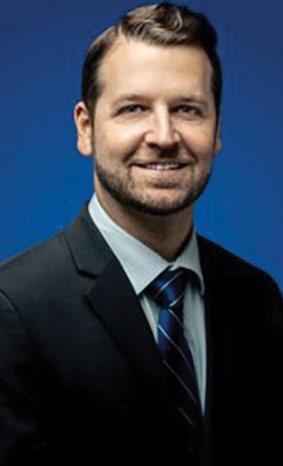
SCbio has implemented multifaceted workforce development and entrepreneurship initiatives, created ongoing programs to encourage participation by women in life sciences, actively supports diversity-equity-inclusion initiatives and encourages student participation in the industry. CRBJ
Ranked
Mount Pleasant Chamber of Commerce PO Box 1635 Mount Pleasant, SC 29465
843-800-2258 www.mountpleasantchamber.org info@mountpleasantbusiness.com
Kathi Herrmann, Jennifer Maxwell, Chris Staubes 1992 405
Mount Pleasant, Daniel Island, Awendaw, McClellenville, Sullivans Island, Isle of Palms
and promote the success of our members through chamber programs, professional development and leadership
Encouraging business and community success East of the Cooper
Tri-County Regional Chamber of Commerce
225 N. Parler Ave. St. George, SC 29477
843-563-8187
843-410-0321 www.northcharlestonchamber.org info@northcharlestonchamber.org
Christina Bruno,
To enhance the quality of life and economic well-being of the citizens of Edisto by working with the local businesses and community leaders as a visible source of information to the public and a source of support to its membership by assisting, connecting, and promoting the business interests with an emphasis on tourism and responsible, environmentally conscious growth
Because of space constraints, sometimes only the top-ranked companies are published in the print edition. For a full list of participating organizations, visit scbiznews.com/buy-business-lists. Email additions or corrections to Listresearch@Bridgetowermedia.com. Information for this list was provided through sur vey responses and additional business research. To be considered for this or other future lists, email listresearch@bridgetowermedia.com. Coverage area includes Berkeley, Charleston and Dorchester counties.
Luray is bringing home the peanuts. Luray Peanut Co., a producer of packaged boiled peanuts, plans to expand its operations in Hampton County. The company’s $5.25 million investment will create 16 new jobs, according to a news release from the South Carolina Commerce Department.
Luray Peanut Co.’s original recipe and Cajun boiled peanut products are available for purchase in convenience stores, grocery stores and stadiums.
The company is headquartered in Hampton County but production was at an out-of-state location, according to a South Carolina Agriculture Department spokesperson.
Located at 973 Main St. in Varnville, Luray Peanut Co. is moving a portion of its current manufacturing to South Carolina to expand its footprint and allow for the production of new product lines, the news release stated.
“We are looking forward to moving a portion of our business into South Carolina,” Luray Peanut Co. CEO Lauren Marcinkoski said in the release. “This will allow us to be able to create and expand on new and existing product lines. We are grateful for the continued support from the South Carolina

Department of Commerce. We look forward to bringing our peanut products home.”
The expansion is expected to be complete by December 2024.
“Luray was already a South Carolina agribusiness success story, and by moving their processing in-house and into the state, they’re creating new opportunities for South Carolina peanut producers,” Agriculture Commissioner Hugh Weathers said in the release.
“We’re proud to support this important step forward for a local business.”
The fresh frozen boiled peanuts are packaged in a poly-weave film bag that can be microwaved, boiled or stored in a warming oven, according to an announcement earlier this year when the product landed in some new retail centers. Luray peanuts were named the official peanut of the NFL’s Jacksonville Jaguars as well as the Charles-
ton Riverdogs. Their loose frozen product is currently sold at Food Lion, Harris Teeter, Ingles, IGA, and Parker’s Convenience stores, as well as dozens of independent markets across the Southeast.
Luray Peanut Co. was founded in 2019 by Corrin Fitts Bowers, a peanut farmer in Luray. He and Marcinkoski partnered together to bring his vision of a scalable boiled peanut product to fruition. Marcinkoski was named CEO of the company in November of 2021, and with the help of Chief Operating Officer James Brown, the company created a product that can be produced in high volumes. The first bags were distributed to stores in March of 2022, and since then Luray Peanut Co. has rolled out its boiled peanut product in hundreds of stores across the Southeast.
“We are thrilled to see the response to our fresh frozen boiled peanuts,” Marcinkoski said in the release. “Our team has worked hard to perfect our recipe and packaging, and we’re excited to bring a healthy and delicious snack option to consumers.”
Gov. Henry McMaster said he welcomed the company’s growth within the state.
“Boiled peanuts have long been a staple of South Carolina culture, and we welcome Luray Peanut Co.’s additional business,” McMaster said in the release. CRBJ
Naval Information Warfare Center Atlantic presented a $70,000 check to BigBear.ai for winning the Palmetto Tech Bridge Autonomy 3 Ways Prize Challenge during the 2023cSC Decoded conference. Before a panel of government experts at a Myrtle Beach conference center, five finalists presented their technical solutions under one or more of three separate artificial intelligence-related tracks. For a single Palmetto Tech Bridge challenge, it was the largest cash prize ever awarded.
Fraunhofer USA, Booz Allen Hamil-
Donors fund library expansion
Begin with Books, the Palmetto Project’s early literacy initiative in Charleston County, has expanded its reach into North Charleston, thanks to $160,000 in new grant funding from The Library Foundation and Charleston Coalition for Kids. Children enrolled in the program receive a free book by mail each month from Dolly Parton’s Imagination Library and a personal letter of encouragement and diploma from the music star when they complete the program on their fifth birthday.
Parents of children under age 5 in zip codes 29418 and 29420 now can enroll their children in Begin with Books. There is no charge for a child to participate. Research suggests that enrolled children are one-third more likely to enter kindergarten with literacy skills required to successfully advance to higher grades.
Begin with Books serves 5,400 children in Charleston County. Its new funding will allow the organization to serve an additional 1,200 children for five years.
The Palmetto Project is working to expand the program to serve all 23,000 children under age five in Charleston County within the next two years. Begin with Books was founded and continues to be run by volunteers. The perchild cost to the Palmetto Project is $33 a year, underwritten with donations from local businesses, community organizations, and individuals. Since 2010, it has provided 503,344 books to 16,216 children in Charleston County. Statewide, more than 45,000 children in South Carolina are currently enrolled.
Butchery and beer garden opens Farm Haus Butcher & Beer Garden, an Indian Land restaurant, butcher shop and beer garden, has opened a new location in the Moultrie Plaza Shopping Center, in Mount Pleasant.
The new location features the same menu as Indian Land, including a variety of sausages, burgers, salads and sharable dishes such as pork belly BLT sliders, pretzel bites, and wings. Sausages are also available for purchase.
ton, and PeopleTec also competed in the prize challenge, which was restricted to organizations with a footprint in South Carolina. AI methods for visually detecting and classifying objects are critical to U.S. military intelligence, surveillance, and reconnaissance. The Autonomy 3 Ways Prize Challenge showed how AI solutions being advanced by the commercial sector can potentially support military intelligence, surveillance, and reconnaissance and other information warfare missions as well.
Currently in its sixth iteration, the
Farm Haus handcrafts its sausages and meats onsite using an Old World process, Heritage-breed pork, and ethically raised chicken and beef.
The 4,000-square-foot outdoor beer garden at Farm Haus features live music on Thursday through Sunday as well as local events and programming, and a large selection of local craft beers on tap from the likes of Holy City, Revelry and New Realm. Cocktails include mason jar concoctions such as the Southern spice margarita and Farm Haus tea made with Dixie vodka.
Farm Haus is open Sunday through Thursday from 11 a.m. to 11 p.m., and Friday through Saturday from 11 a.m. to 12 a.m.
Water Mission earns 4-star rating
Water Mission, an engineering nonprofit, has earned a four-star rating from Charity Navigator for the 17th consecutive year. This rating designates Water Mission as an official “Give with Confidence” charity, indicating that the organization uses its donations effectively based on Charity Navigator’s criteria.
Since 2001, Charity Navigator has been a source of information for more than 11 million donors annually. Water Mission earned a perfect 100% score for the first time since 2019.
Water Mission’s global operations have served more than 8 million people since 2001.

Palmetto Tech Bridge prize challenges crowdsourced technical solutions from the public by first defining a naval problem and then inviting commercial and academic organizations to compete for the best solution. Competitions are funded by NIWC Atlantic and organized by the Palmetto Tech Bridge. Challenges can also help commercial and other non-federal entities collaborate with government labs to spark innovative ideas and solutions on other fronts, such as cooperative research and development agreements.
sion Culture course, these interactive 120-minute workshops provide emerging and seasoned leaders with practical advice and culture cheat codes, which are best practices that translate to immediate application and success.
The first two workshops, one on conflict resolution and the other on collaboration, took place in October and November. The final workshop, on creative thinking, took place on Dec. 7 and covered what bear, honey, and telephone polls have to do with expanding the creative aspects of the thought process. Each in-person workshop was held at the new Cohesion Culture headquarters in Mount Pleasant.

Porter-Gaud School marked National Historically Black Colleges and Universities (HBCUs) Week with a breakfast program that was open to the Porter-Gaud community as well as other schools in the area.
The program highlighted the role of HBCUs in the nation’s history and shared their offerings as higher education institutions. Attendees heard from current and former students who have attended HBCUs.

Moore & Van Allen health care member
Charles M. Jordan Jr. was selected to participate in the Diversity Leaders Initiative, a program of Furman University’s Riley Institute. Jordan is one of 42 individuals selected for the 17th Lowcountry cohort.
Jordan is taking part in an interactive curriculum consisting of case studies, scenario analyses, and other experiential learning tools intended to maximize interaction and discussion among classmates and facilitate productive relationships. Working alongside his classmates, he will also develop a capstone project that raises awareness of community need. Classes are facilitated by Juan Johnson, an independent consultant who was the Coca-Cola Co.’s vice president for diversity strategy.

Marcus Aguayo, a commercial construction veteran in the Charleston market for more than 20 years, has joined The Cornerstone Co. as senior estimator. He brings considerable estimating and project management experience to this role.

Frampton Construction Co. has added LV Hanson as director of people. Hanson joins the company with 20 years of culture, leadership and human resource experience across a diverse range of organizations and industries.
As director of people, Hanson leads the company’s people team, which focuses on Frampton’s holistic employee journey, including talent acquisition and management, human resource operations and partnerships, and the Frampton Empowers leadership development program.
As an extension of the Cohe-
HBCU Week started in the 1980s after President Jimmy Carter designated it as an official celebration. HBCUs have been educating black students since 1837. Today, there are more than 100 HBCUs across the country.
Hanson graduated from the University of Colorado at Boulder with a Bachelor of Arts in communications and business. Though based in the Charleston office, he frequently travels to Frampton’s Charlotte and Tampa locations.
Terracon has promoted Hayden W. Seignious, P.E., to senior associate. He is the Charleston department manager in the materials services department. Seignious, who has See PEOPLE, Page 18
Lists:
Power List: Logistics
Advertising Deadline: February 5
more than 10 years of experience managing special inspection and materials testing programs within South Carolina, graduated from The Citadel.
The Governor’s School for the Arts and Humanities Foundation board of directors has four new members. The new board members can serve a maximum of two terms. They are Jo Bettis, senior vice president-wealth consultant, First Citizens Wealth Management; Tamara Buie, chief people officer, Level Legal; Carl Maki, director of sales-reinforcing products group, South Atlantic Galvanizing; Stephanie Mundy-Self, partner, Ferris, Self & Moore; Jane Taylor, co-owner, Gatsby Glass of Greater Charleston.
Mason Prep has added five new faculty members: Shelly Aksomitas, Karlien Eiseman, Stacey Keller, Tyler Merillat and Mary Lang Regen
Aksomitas, a sixth-eighth-grade math teacher, has taught in the Charleston County School District and has a National Board Certification in adolescent mathematics. She earned her Bachelor of Arts in elementary education and her master’s in math and science education from The College of Charleston.


latest family law attorney to join the group. A civil court arbitrator and mediator, Partain is a member of the United States Supreme Court Bar and is admitted to practice in Federal Court. She is a Clemson University and a Charleston School of Law alumna. After earning her law degree, Partain returned to Charleston Law for several years as an adjunct professor of legal research and writing.
New in NP Strategy’s Charleston office is specialist Morgan Grimes. She brings three years of experience in Lowcountry government and community relations to her new role.
Lists:
Advertising
Eiseman, a media specialist and seventh-grade literature teacher, comes to Mason Prep from Buist Academy, where she taught fifth-grade language arts and advised the creative writing club. Eiseman received her Bachelor of Science in education in middle childhood education from Kent State University and her master’s in education in advanced studies from the American College of Education.
Keller, a kindergarten associate teacher, comes to Mason Prep from the Charleston County School District, where she worked in literacy intervention. Keller received her Bachelor of Arts in elementary education from the University of Kentucky and her master’s in education from Georgia State University.
Merillat, a physical-education teacher and assistant athletic director, was previously at Cleveland State University, where he served as assistant athletics director, academic services. He received his Bachelor of Science from Bowling Green State University and his Master of Science from the University of Oklahoma.
Regen, a fourth-grade teacher, comes to Mason Prep from Legette Blythe Elementary School in Charlotte, where she taught second grade. She received a Bachelor of Arts from the University of North Carolina, Chapel Hill.
Saxton & Stump’s new attorney is Jessica Partain. She brings more than a decade of experience in family law and has handled complex family law matters. Partain’s practice focuses on all aspects of family law, including divorce, child custody and support. The group is chaired by Rene Stuhr Dukes. Partain is the

Previously, Grimes was the communications and outreach specialist for the Berkeley-Charleston-Dorchester Council of Governments, where she worked with Lowcountry Rapid Transit, South Carolina’s planned bus rapid transit system. During her tenure with the council, Grimes developed communication strategies, particularly those geared toward stakeholder engagement. Grimes graduated from the University of South Carolina with a Bachelor of Arts in public relations. During her time at USC, she served as public relations chair for the National Association of Black Journalists and as a social media assistant for USC’s alumni association. Grimes is pursuing a master’s degree in strategic communication from Purdue University.
Florence Crittenton Programs of South Carolina named Jamee Haley, Tara Palmatier, Sheri Cooper and Jenna Braddy to the executive committee of its board of directors for the 2023-2024 term.
Haley, president, is chief executive officer of Jamee Haley Consulting. She is a strategic adviser with expertise in nonprofits including start-ups, fund diversification, federal grants, social enterprises, coalition building, finance, board development and strategic planning. Prior to starting her consulting firm, Haley was co-founder and executive director of Lowcountry Local First.
Palmatier, vice president, is professional services director at Blackbaud. Her background in managing large global delivery teams across portfolios and solutions includes leveraging data to optimize teams and delivery.


Most economists expect the economy to slow in the first half of 2024 and some still anticipate a recession in the months ahead. That appears to be an increasingly unlikely scenario.

The economy closed out last year on a strong note and that strength appears to be carrying over into January. Consumer confidence has soared in the past two months.
The stock market has reached a new record high level. Homebuilders are enthusiastic as mortgage rates have fallen. Housing affordability will jump sharply as the year progresses. The weekly data for initial unemployment claims (layoffs) suggests that employment likely rose a solid 160,000 in January and the unemployment rate remained near a 50-year low of 3.7%.
The Fed has kept the funds rate at 5.5% for now, but market rates – the mortgage rate in particular — have fallen by more than a percentage point in the past two months. As the inflation rate continues to subside, it is just a matter of time before the Fed begins a protracted


easing cycle.
Economic headwinds are soon to become tailwinds. The economic slowdown, in our opinion, is history. Expect 1.8% GDP growth in the fourth quarter of last year to be followed by steady 1.5% gains in the first two quarters of 2024.
Consumer sentiment is on the rise. It has risen 28% in the December/January period as consumers expect to see reduced inflation, continuing job gains, steady GDP growth, and lower interest rates as the year progresses. It is now at its highest level since July 2021.
Part of the gain in consumer sentiment is almost certainly associated with the stock market climbing to a record high level in mid-January.
Homebuilder confidence jumped 10 points in the December/January period and now stands at 44. The surge in confidence was fueled by a decline in mortgage rates from a peak of 7.8% in October to their current level of 6.6% on their way to 6.25% by yearend. This gain in builder confidence is almost certain to translate into a further increase in housing starts as the year progresses.
On the demand side of the housing market the drop in mortgage rates is going to significantly boost housing affordability as the year progresses.
In October the housing affordability index hit bottom at 91 which means

 (Photo/DepositPhotos)
(Photo/DepositPhotos)

that a potential home buyer had 9% less income than required to purchase a median-priced home. But with the drop in mortgage rates and a likely decline in home prices as builders increase the supply of homes, that median-income family should have 25% more money than required to purchase a median-priced home by the end of this year.
The required down payment and the monthly payments should fall sharply as the year progresses and provide considerable stimulus to the housing market.
In the labor market, initial unemployment claims — a measure of layoffs — has been steady through mid-January which suggests that payroll employment will likely rise by about 160,000 in that month. If at the same time earnings increase steadily, consumer income will continue to climb which will provide the fuel for additional gains in consumer spending.
Given declines in the money supply in the past year, the excess liquidity in the economy — which fueled the run-up in inflation for the past couple of years — should disappear entirely by spring.
That, in turn, suggests that the core inflation rate should drop from 3.9% currently to perhaps 3.1% by yearend.
Against this background the Fed will almost certainly begin a lengthy easing cycle by summer. We expect the funds rate to fall from 5.5% currently to 4.75%
by yearend, but then continue to slide toward the 2.5% mark during the course of 2025 and into 2026.
The combo of rising consumer confidence, a record level of stock prices, a sharp jump in housing affordability, steady job gains and rising wages, reduced inflation, and the beginning of a protracted cycle of lower interest rates is not a recipe for a slowdown in the pace of economic activity. Accordingly, we have raised our forecast for the first half of the year from 0.7% to 1.5%.
From 1980 until 2003, when he retired, Stephen Slifer served as chief U.S. economist for Lehman Brothers in New York City, directing the firm’s U.S. economics group along with being responsible for forecasts and analysis of the U.S. economy. He has written two books on using economic indicators to forecast financial moves and previously served as a senior economist at the Board of Governors of the Federal Reserve in Washington, D.C. Slifer can be reached at www.numbernomics.com.















The Book of Lists is an indispensable, comprehensive guide that includes information on more than 1,500 companies doing business in the Lowcountry. Businesses are ranked according to number of employees, revenue, square footage and other criteria, giving you a ready reference on prospective clients.
The Book of Lists has a 12-month readership life and appears in print and electronic format. It is distributed to area chambers of commerce, economic development offices and every subscriber and advertiser of the Business Journal..
Put 12 months of exposure to work for you.

















PUBLICATION DATE: March 25, 2024
ADVERTISING DEADLINE: February 23, 2024



